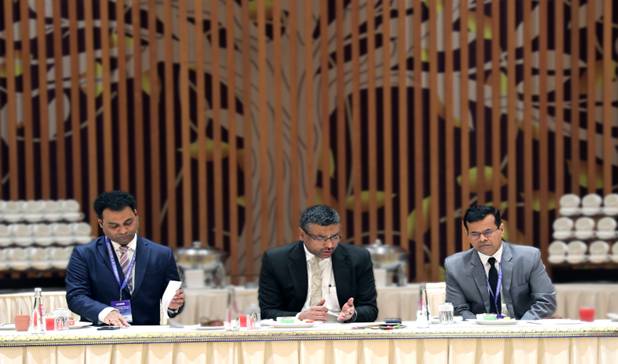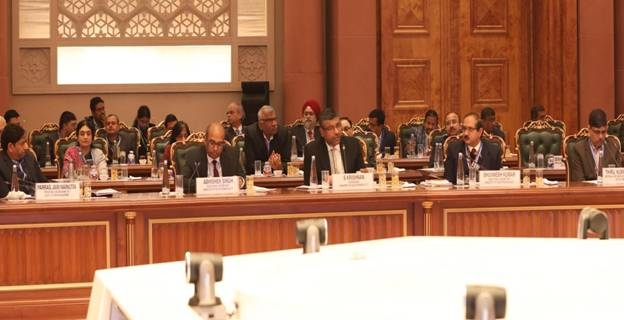Discussions held on transforming governance with emerging technologies: AI, IoT, and Blockchain take center stage

FinTech BizNews Service
Mumbai, 23 December, 2024: A Conference of State IT Secretaries, senior officials of Ministry of Electronics and Information Technology (MeitY) and States/UTs was held on December 17, 2024 at Bharat Mandapam, New Delhi. The meeting was organised under the chairmanship of Secretary, MeitY, Shri S. Krishnan with the objective to further collaborate and support the digital endeavours of States/UTs to usher in the next generation digital transformation including improving quality of government services, bridging the digital divide, automation of backend processes, undertaking data protection and cyber security measures.

Digital growth and empowerment
The meeting was attended by State IT Secretaries and other senior officers from 34 States and UTs, apart from high level officers from MeitY. Discussions were held with North East and hilly states (Arunachal Pradesh, Assam, Himachal Pradesh, Jammu & Kashmir, Ladakh, Manipur, Meghalaya, Mizoram, Nagaland, Sikikim, Tripura and Uttarakhand) at a breakfast meeting chaired by Secretary, MeitY.
The need for developing infrastructure, adoption of e-office and extension of Bharat Net at the block-level were some of the topics in focus. Additionally, effectiveness of capacity building initiatives and promotion of further training and entrepreneurship were also deliberated.
Recent initiatives by MeitY
A series of sessions were organised wherein senior level officers from MeitY gave presentations on recent initiatives undertaken by MeitY and its organisations; the sessions included impactful presentations on partnering with states for expanding Aadhaar usage and strengthening the Aadhaar authentication and enrollment & update systems; how the IndiaAI Mission will drive responsible, inclusive growth of the AI ecosystem; integrated cyber security management for states; GoI’s landmark DPDP Act 2023; the development of India’s semiconductor ecosystem through the India Semiconductor Mission; and policy and regulatory issues relating to electronics manufacturing. Thereafter, an interactive session chaired by Secretary, MeitY was conducted to take feedback and suggestions from States/UTs on the initiatives presented.
Parallel thematic breakout sessions held under the following pillars
Topics discussed under Pillar 1
Discussions under Pillar 1 with States such as Telangana, Uttar Pradesh, Karnataka centred on developing secure and structured platforms for seamless data exchange between government departments and stakeholders. It was recommended that states and UTs follow strong cybersecurity procedures and guarantee adherence to the DPDP Act. To improve citizen-centric services and operational efficiency, it was emphasised that robust data protection measures and the use of standardised, machine-readable formats were essential.
Topics discussed under Pillar 2
The discussion on Pillar 2 focused on strengthening state digitalisation efforts. Representatives from Tamil Nadu, Madhya Pradesh, Bihar, Jharkhand, Ladakh, Andaman and Nicobar Islands etc., participated and gave recommendations for strengthening state IT agencies, creating a family registry, and facilitating two-way data interchange between the union and state governments.
Consensus was also reached on discussions for benchmarking departmental digitalisation with the best practices of IT-savvy states; consent and anonymisation mechanisms in standard operating procedure for onboarding of private sectors; and mandatory thorough security audits of software and hardware before and on a regular basis even after the launch of digital solutions.
Topics discussed under Pillar 3
Discussions under the Pillar 3 centered on standard data modeling and the use of AI, ML, IoT, drone, and blockchain technologies. Common consensus reflected ensuring technologies are designed to be usable by the general public as well as people with diverse abilities and needs. The aim was to deliberate upon enhancing the quality of life for citizens by integrating technologies like Artificial Intelligence, Machine Learning, the Internet of Things, Drone use, etc.
Participants talked extensively on the use of technology to improve citizen-government interactions and modernize government operations, making them more open, efficient, and accessible while guaranteeing 24/7 access to information and services. Additionally, it was emphasised to use more innovative applications of technology in a variety of fields, including healthcare, education, agriculture, and environmental sustainability.
Government leaders unanimously agreed that emerging technologies have the power to transform society and build a future in which technology unites people, builds trust, and protects their interests. States & UTs will innovate, envision such crucial needs, and formulate specific programs in their particular growing technology fields as they go forward with executing these initiatives.
Strengthening digital governance and collaboration among states
States such as Andhra Pradesh, Gujarat, Uttarakhand and Delhi resolved to handhold and bring every state and district to a common digital infrastructure. Overall, the meeting aimed at enhancing digital service delivery and fostering collaboration among states, establishing a robust foundation for the future of governance in India. Participants voiced their commitment to building a unified digital framework that integrates seamlessly with national digital infrastructure.
As India continues its journey towards an enhanced digitally empowered governance model, the outcomes of this meeting are expected to play a pivotal role in shaping the future of public service delivery in the country.*